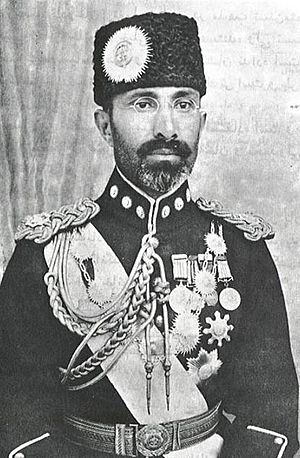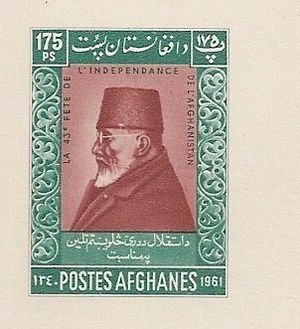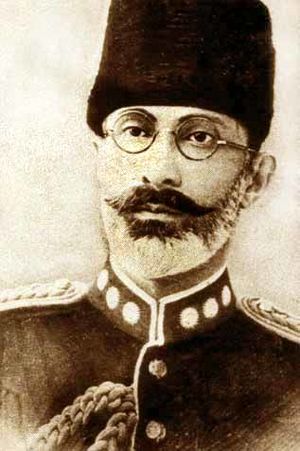Mohammad Nadir Shah facts for kids
Quick facts for kids Mohammad Nadir Shah |
|
|---|---|
 |
|
| King of Afghanistan | |
| Reign | 15 October 1929 – 8 November 1933 |
| Predecessor | Habibullāh Kalakāni |
| Successor | Mohammad Zahir Shah |
| Born | 9 April 1883 Dehradun, British India |
| Died | 8 November 1933 (aged 50) Kabul, Afghanistan |
| Burial | King Nadir Shah Mausoleum |
| Spouse | Mah Parwar Begum |
| Issue | Sardar Muhammad Tahir Khan King Mohammad Zahir Shah Tahera Khanum Princess Zuhra Begum Princess Zainab Begum Princess Sultana Begum Princess Bilqis Begum |
| House | Musahiban |
| Father | Mohammad Yusuf Khan |
| Mother | Sharaf Sultana Hukumat Begum |
| Religion | Sunni Islam |
Mohammad Nadir Shah (born Mohammad Nadir Khan on April 9, 1883) was the King of Afghanistan. He ruled from October 15, 1929, until he was assassinated in November 1933. Before becoming king, he was a general in the Royal Afghan Army. He also served as the Minister of War and as Afghan Ambassador to France. Nadir Shah and his son, Mohammad Zahir Shah, who became king after him, were part of the Musahiban family.
Contents
Early Life and Family Background
Nadir Khan was born on April 9, 1883, in Dehradun, which was then part of British India. His family belonged to the Musahiban branch of Afghanistan's royal family. This branch was part of the Mohammadzai section of the Barakzai Pashtuns.
His father was Mohammad Yusuf Khan, and his mother was Sharaf Sultana Hukumat Begum. Nadir's ancestors had been sent away to British India by Emir Abdur Rahman Khan. This happened because the Emir thought they wanted power.
In 1901, Emir Abdur Rahman Khan died, and Habibullah became the new emir. In 1912, Nadir helped the Afghan government put down the Khost rebellion. Later, Nadir's family moved back to Afghanistan. Nadir became the Minister of War under King Amanullah Khan.
How He Rose to Power
Nadir Khan first came to Afghanistan when his grandfather was allowed to return from exile. He became a general under King Amanullah Khan. He led the Royal Afghan Army during the Third Anglo-Afghan War. After this war, Nadir Khan became the Minister of War. From 1924 to 1926, he served as the Afghan Ambassador to France.
Later, Nadir Khan was sent away from Afghanistan because he disagreed with King Amanullah. A rebellion then broke out against King Amanullah, led by Habibullāh Kalakāni. After King Amanullah was overthrown, Nadir Khan returned to Afghanistan. He came with an army of Mangal, Mahsud, and Wazir tribesmen.
His forces took control of most of Afghanistan. On October 13, 1929, Nadir's loyal forces captured Kabul. Nadir himself arrived in the city on October 15. He captured Kalakani and had him executed on November 1, 1929.
Becoming King of Afghanistan
As the new Shah (King) of Afghanistan, Nadir Khan quickly ended most of the changes King Amanullah had made. He tried to rebuild the army, but it remained weak. Religious and tribal leaders became very strong during this time.
King Nadir faced many challenges and small rebellions. These included the Koh Daman revolt and the Shinwari rebellion in 1930. There were also issues with an Uzbek leader whose forces were causing trouble from Afghanistan. The Afghan army pushed them back in April 1930. By the end of 1931, most of these uprisings had been stopped.
Nadir Khan created a cabinet with ten members, mostly from his own family. In September 1930, he called a large meeting called a loya jirga. This meeting had 286 people who confirmed him as the new king. In 1931, the King introduced a new constitution. This document made Afghanistan seem like a constitutional monarchy. However, it mostly gave power to the royal family.
Nadir Khan made sure to respect religious traditions in the constitution. But he also worked to modernize Afghanistan in practical ways. He improved roads, especially the Great North Road through the Hindu Kush mountains. He also worked on communication methods. In 1931, he helped start Afghanistan's first university, Kabul University, which began admitting students in 1932.
He also built trade connections with other countries. Under the guidance of important business people, he started a banking system. He also created long-term plans for the country's economy. While his efforts to improve the army took some time, by the time he died in 1933, Nadir Shah had built a strong military force of 40,000 soldiers.
Assassination
On November 8, 1933, King Nadir Khan was visiting a high school. He was attending a graduation ceremony. During the event, he was shot and killed by a person named Abdul Khaliq. King Nadir Shah was buried in Kabul on Nader Khan Hill.
Titles and Styles
| Styles of Mohammed Nadir Shah of Afghanistan |
|
|---|---|
 |
|
| Reference style | His Majesty |
| Spoken style | Your Majesty |
During his time as ruler, he was known as His Majesty Mohammed Nadir Shah, King of Afghanistan.
See also
 In Spanish: Mohammed Nadir Shah para niños
In Spanish: Mohammed Nadir Shah para niños
 | George Robert Carruthers |
 | Patricia Bath |
 | Jan Ernst Matzeliger |
 | Alexander Miles |



